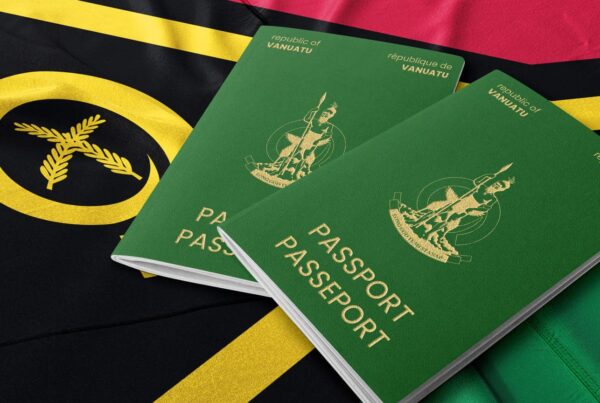By Martin St-Hilaire, Director, AJC Vanuatu and Chairman of the FCA
As IMI reported on Wednesday, the European Commission (EC) has proposed suspending the visa exemption for Vanuatu passport holders who travel to the Schengen area. If approved by the European Council, this will deal a serious blow to our country’s Citizenship by Investment (CBI) program.
Since the beginning of the pandemic, when our tourism industry disappeared overnight, our CBI program has been a veritable lifesaver for our government, accounting for up to half of public revenue. Vanuatu is COVID-free, our borders are shut, and tourism revenues have evaporated. Our country was already very poor and struggling to get by. By proposing this sanction, Brussels is further threatening the well-being of our people. They’d better have a very good reason to do so.
Much to our dismay, the European Commission proposal is a collection of misguided notions and fallacious statements that are quite simply detached from reality.
#1 – The fallacy of the low rejection rate
The EC finds that our program’s “extremely low rejection rate (…) raises doubts as to the reliability of the security and due diligence screening”. This is shockingly false. All CBI applications go through three steps of vetting before they are submitted for approval by our Citizenship Commission, with the precise goal of rejecting problematic cases.
First, applicants can be refused at the initial stage by the program’s Designated Agent, a professional who acts as the first gatekeeper by performing know- your-customer (KYC) checks using globally recognized online platforms such as Refinitive’s World-Check. Applicants can be disqualified at this stage – some automatically – because of a criminal record, inclusion in databases of suspicious individuals, the inability to pay funds, or simply because they give up when faced with the vetting questions.
Vanuatu’s Financial Intelligence Unit takes charge at the second step, where applicants must provide US$5,000 along with a dated and signed CV, a notarized criminal clearance from the police authorities in their country of origin (or residence, if different), a notarized passport copy, and a notarized residency card where applicable. All applicants go through the usual criminal database checks – Interpol, World-Check, UN sanctions, etc. All documents need to be certified by a solicitor, justice of the peace, commissioner for oaths, or public notary. The Financial Intelligence Unit uses both an online platform to perform the first background check and an independent third party to perform a second. If no flags are raised, the Unit produces a clearance letter that is essential for an applicant to advance to Step 3.
The third step is yet another fund transfer by the applicant to their Designated Agent’s account at the National Bank of Vanuatu, which runs more know-your- customer and anti-money laundering verifications, this time in accordance with the Bank’s own requirements.
Finally, when all three steps are completed and only then, the application is presented to the Citizenship Commission. After all this pre-qualifying, it is completely normal for its rejection rate to be low. But the European Commission flatly ignores the whole pre-approval process and calculates the rejection rate solely on the basis of successfully vetted applicants!
#2 – The Interpol red herring
The EC goes on to state that Vanuatu citizenship has been granted to applicants listed in Interpol databases.
Any Vanuatu citizen naturalized through our CBI program who turns out to be a convicted criminal will have their citizenship revoked immediately. Few such cases have come to light and our authorities have acted accordingly. But it’s quite the stretch to present it as a generalized trend. The EU should provide help to Vanuatu in flagging and sanctioning any wrongdoing, instead of flat out suspending our visa exemptions.
Hopefully, the comprehensive retroactive applicant review announced on Friday by the Citizenship Commission, with UK agency FACT acting as due diligence provider, will clear out any doubt and appease the EC on this issue.
#3 – The bizarre complaint about original nationalities
Offering some extremely strange reasoning, the EC complains that successful CBI applicants are using their new Vanuatu passport to obtain a visa exemption while their other passport – the one from their country of origin – does not grant such privilege and that somehow this creates a security threat.
Since when is being a naturalized citizen cause for suspicion?
There have been about 10,500 passports granted through Vanuatu’s CBI program – a speck in the global CBI industry. The vast majority of applicants were Chinese nationals. Once they became Ni-Vanuatu, they naturally enjoyed (up until now at least) visa-free entry to the 26 countries of the Schengen zone, among others.
This is also true for the 628,254 citizens naturalized by the U.S. in 2020 alone, whose countries of origin are all over the place.
And there’s absolutely nothing wrong with that! Once our borders reopen, we will also happily welcome to Vanuatu any of the numerous naturalized citizens of EU member countries and offer them the same visa on arrival as we offer European natives, no questions asked.
The EC doesn’t even act on its own principles regarding the many other CBI programs around the world. In fact, this is the very first time it ever proposed sanctions on a country for running a CBI program.
#4 – The ludicrous argument of physical presence
For many years, the EC has complained to Vanuatu authorities about the lack of physical presence or residence requirements for CBI applicants, even though “there is no obvious connection between physical presence and elimination of security risks,” as EU citizenship law expert Professor Kochenov rightly pointed out on Friday.
The EC states: “’While naturalization procedures are Vanuatu’s sovereign decision, very strict security background checks are essential to prevent any abuse.” As mentioned above, we do have strict KYC and AML checks in place; this is the only thing that should matter. The other conditions of the program are sovereign decisions that have zero effect on abuse prevention.
An unjust attack on Vanuatu’s sovereignty
In the grand scheme of global CBI, Vanuatu is granting very few citizenships – about 2,000 a year – based on the wealth and probity of applicants, with all the proper background checks in place.
Still, enough people have become Ni-Vanuatu to make up a sizable statistical sample. And despite all the scrutiny by the European authorities and despite last year’s investigation by The Guardian (which was quickly debunked), we are still waiting to see hard evidence that our CBI program helps ill-intentioned individuals commit crimes.
This proposal by the EC is nothing less than an attack on Vanuatu. We play by the rules, but the European Commission refuses to acknowledge it and resorts to bad faith and blatant falsehoods to force its will on our tiny nation. We can’t defend ourselves, we lack allies, no one is standing up for us, and we are bullied in broad daylight while we are simply trying to exercise our sovereignty.





